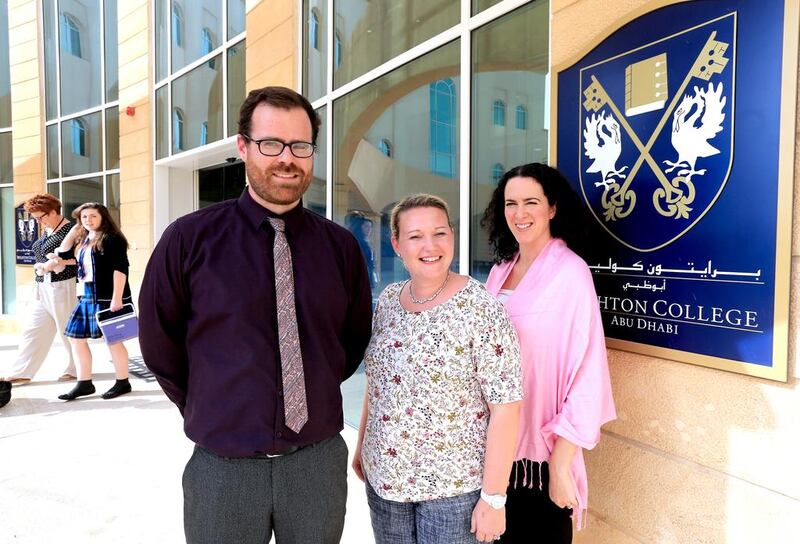Teachers from austerity-hit Europe have been unpacking their bags and starting out in new schools in the Emirates this week, drawn by the promise of a booming economy.
Ruth Forsythe, a 35-year-old music and performing arts teacher from Northern Ireland is one of hundreds of men and women who have taken the plunge to move their families to the emirate from Europe in search of career opportunities and a new life.
Mrs Forsythe, who left her job as head of music at a school in Northern Ireland to come to the UAE, this week started her new role as director of music at Abu Dhabi's Brighton College.
"In the UK and especially Northern Ireland teaching jobs have become very static with teachers staying in positions for longer, leaving fewer opportunities for those just qualifying," she says. "As a family we decided on a life change and as teaching is universal, my career opened the door to Abu Dhabi."
Her colleague, Andrew McLoughlin, a 36-year-old Canadian who has just taken up a post at Brighton College as an English teacher, agrees.
"I had been teaching in the UK for seven years and was keen for a change of scene," he says. "Abu Dhabi offered the perfect opportunity to live somewhere new and exciting while gaining valuable experience at a fantastic school."
Certainly this term teaching recruitment companies are reporting a boom in the number of English-speaking teachers coming to the UAE, driven by limited job prospects at home and an increase in the number of schools in the country.
According to data from the education data company International Schools Consultancy Group (ISC), the number of teaching jobs at international schools in Abu Dhabi has increased 42.6 per cent from 4,451 in 2009 to 6,348 in 2013 and is set to increase even further this year as four new British and American schools open in the capital this month.
These include GEMS Cambridge International School, Diyafa School, Repton School and Aliaa International School as well as Al Shohub, which has been operating since 1999 but is moving to a new site in Khalifa A because of an increase in numbers and curriculum expansion. Four new Indian schools have opened this term.
And in Dubai the number of teaching jobs has risen 31.8 per cent from 10,007 in 2009 to 13,190 in 2013, according to ISC.
"Abu Dhabi has been an especially high growth area for international schools and we are seeing a lot of new schools opening and looking for staff," said Andrew Wigford, the director of Teachers International Consultancy, a teaching recruitment agency in the United Kingdom.
Demand for private school places already outstrips supply by about 25,000 according to Abu Dhabi Education Council, and the council estimates that by the 2015-16 academic year demand will have risen by a further 25,000. In the past academic year about 175,000 children - 60 per cent of all pupils in the emirate - attended private schools in Abu Dhabi. Of the 183 private schools, 70 per cent were oversubscribed.
Lettings agents in the capital report that they are having to show so many new teachers around new accommodation that they have been forced to conduct mass viewings on a hired bus.
"It has been extremely busy for us," said Drica Rodriguez, the residential leasing manager at Cluttons' Abu Dhabi office. "One of my agents who is heavily pregnant has been showing groups of 30 teachers around the city on a bus so that we can get them to see all the possible locations. Then when they have an idea of where they want to rent we take them out individually. It's the easiest way to do it when there are so many of them."
ISC reports that the majority of teachers at English language schools in Abu Dhabi and Dubai come from the UK and the USA. However, teachers from Ireland make up a growing contingent.
Most new teachers in the recession-hit Republic of Ireland spend their first few years substituting or working on short-term contracts, with no guarantees of work for the following year.
According to estimates from the Teachers' Union of Ireland, Irish secondary-school teachers currently take an average of five years to secure a permanent teaching job at home, and even then many of them have to work part-time.
In 2011, a survey by the Association of Secondary Teachers in Ireland of more than 660 final-year second-level education students found one in 10 were not even going to apply for teaching work in Ireland when they graduated. Reasons cited for looking abroad in pursuit of jobs were: shortage of teaching posts; a reluctance to spend years in part-time positions; and cuts to starting salaries.
But for new teachers in Abu Dhabi the prospects seem bright.
"We were attracted to Abu Dhabi by desert adventure, the sea, the chance to be part of something new and exciting," says 37-year-old Louise Brashier, who is starting her job as a humanities teacher in Abu Dhabi this term. "Abu Dhabi feels like a blank canvas and we are looking forward to seeing the picture develop."
lbarnard@thenational.ae
Expat teachers escape austerity-hit Europe for booming UAE
Teachers from austerity-hit Europe have been unpacking their bags and starting out in new schools in the Emirates this week drawn by the promise of a booming economy.

More from the national




